The next time you find yourself in Nashik, Maharashtra, here’s an idea: Enter your destination as ‘Adiem Kaanan Farmstay’ in your Maps app. Then put your faith in the winding roads as the GPS guides you to a six-acre piece of land many call ‘an unexpected beauty’.
Pro tip: While you keep the road in focus, allow yourself a glance or two outside the windows. When it comes to delicious views, the ‘Grape Capital of India’ doesn’t disappoint. Miles of will guide you to this farmstay which is one of Nashik’s best-kept secrets.
Built with locally-grown bamboo and mud from the fields, the farmstay is sustainability personified, not just in its construction but also in the quotidian habits of the family that runs it.
Madhu Chougaonkar, the proud 59-year-old host, has a repository of such stories to narrate, but there will be time to hear all of them later, preferably over some tasty food.
As you enter the premises, I want you to take a minute to admire the lamps in the homestay’s living room. Would you believe that they are made from recycled wood?
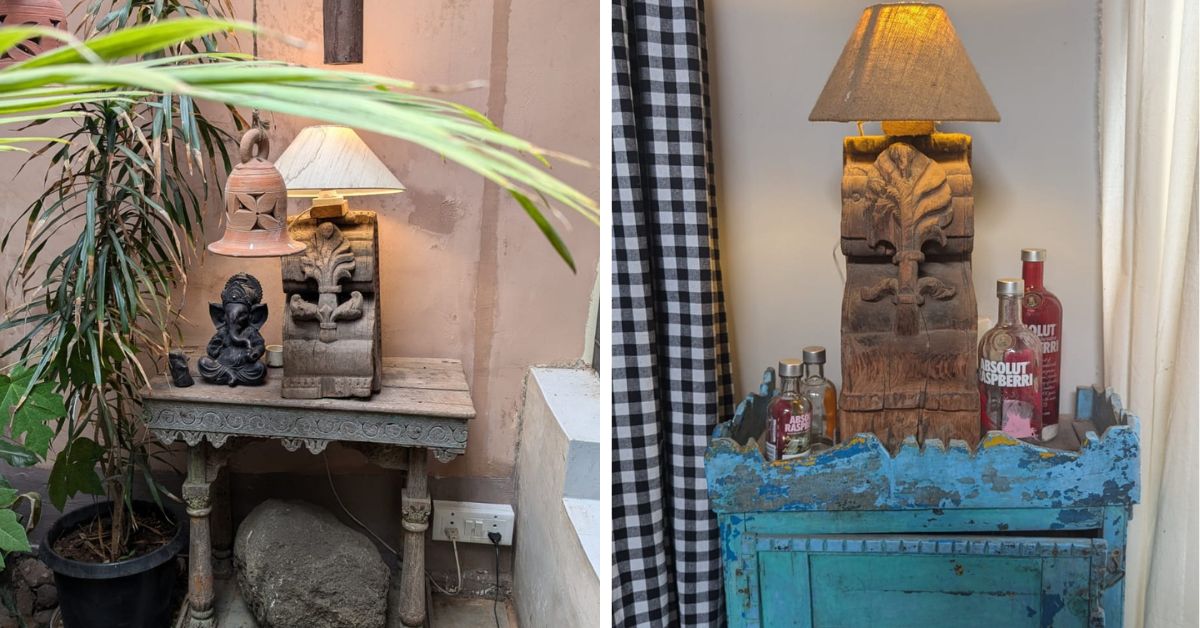
The lamps and other decor at Adiem Kaanan Farmstay in Nashik, are made of recycled wood, Picture source: Disha
As Madhu’s daughter, Disha Madhu (Disha and her brother Deek have taken their mother’s name as their last name to shatter patriarchal stereotypes) points out, the lamps are one of the many in the homestay.
For a PhD graduate — Madhu has done her doctorate in ‘Reconstruction of Eco-Feminism’ — and a designer — Disha was working with a leading sports goods retailer in Bengaluru — it must have taken guts to quit the corporate hustle and set their sights on greener pastures (pun intended).
“Not really,” says Disha. “Just a wake-up call.”
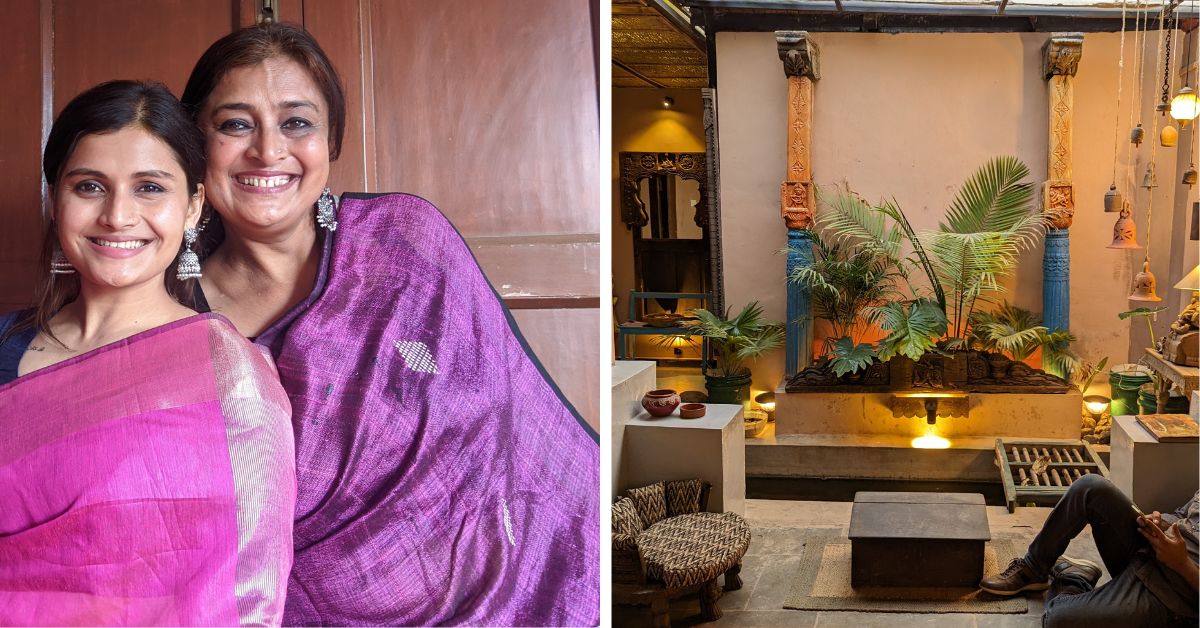
Disha and her mother Madhu run two homestays at Nashik village and Nashik City respectively, Picture source: Disha
What would your first thought be if you saw a pretty t-shirt priced at Rs 200 and on sale? “How cheap! Let me buy it.”
Madhu would react the same way when she saw such offers on her shopping expeditions, not just in India but also in Bangladesh and Pakistan, where she was working with NGOs championing change at grassroot levels in underserved communities.
Her experiences gave her an insight into supply chains and the workings of economies. “My research made me realise that what we call ‘cheap’ is actually very expensive,” she notes.
Explaining this critique, she says, “While a product may seem economical from a monetary standpoint, there is so much exploitation that goes into producing certain items, like clothes for example. This includes labour, the many , and the unfair wages paid to those involved. If you look at it from this perspective, you’ll agree that nothing is ‘cheap’ even when it appears to be.”
Her two-decade-long experience in the development sector, during which she was associated with UNICEF and other affluent names, shaped her way of thinking and living.
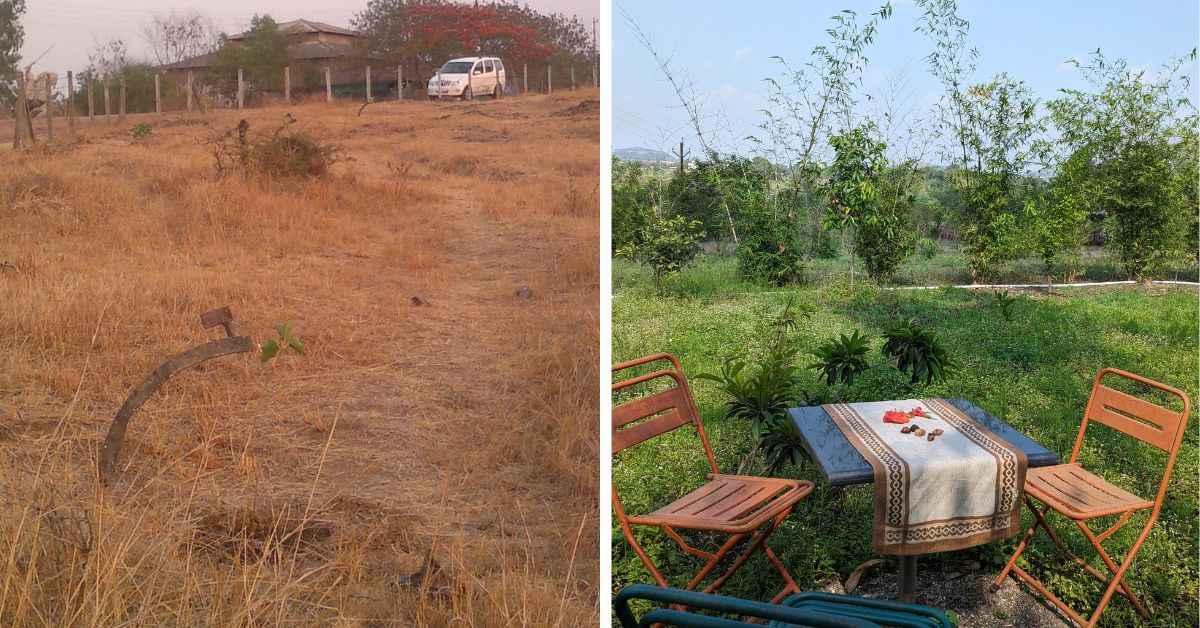
The mother-daughter duo transformed the barren land into a thriving organic farm, Picture source: Disha
“Sustainability needs to be a way of life,” she believed. And, the way the Adiem Kaanan Farmstay is designed makes a good case for the point Madhu is trying to drive home.
Disha seconds her mother. “Sustainable living was the only kind of life we knew. Even before ‘sustainability’ was a buzzword, our family believed in it very strongly.”
Letting us in on how the two homestays — Adiem City Homestay in Nashik City and the Adiem Kaanan Farmstay 12 km away in the village — were born, Disha says it was a series of fortunate events that shaped things up.
The city homestay was where the family lived. In 2012, when Disha and Deek moved to Mumbai to study, the silence in the house was telling. It was around this time that Madhu and her husband, Arvind Chittewale, threw open the home’s doors to guests who were intrigued by its mud structure.
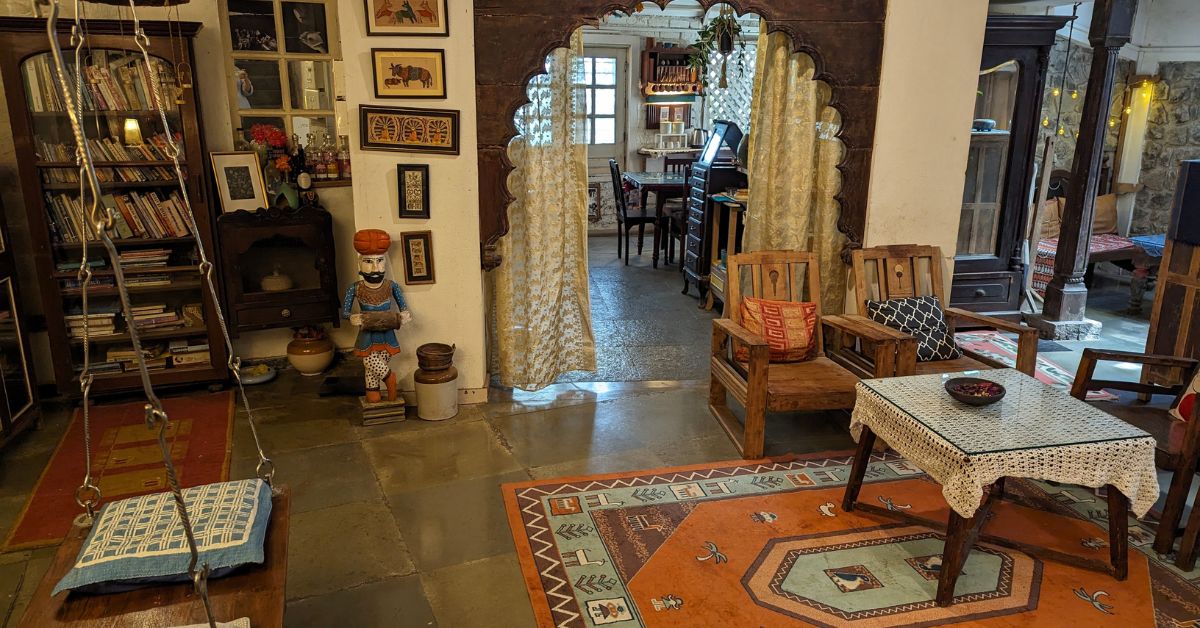
The Adiem City Homestay is made of mud and features recycled decor in every corner of the house, Picture source: Disha
They enjoyed a phenomenal response. “People were genuinely interested in experiencing and understanding the alternate lifestyle that we were leading. And this motivated our decision to run Adiem City Homestay commercially,” Disha notes.
While the homestay saw Madhu for part of the day, a patch in the village 12 km away (that she had purchased that same year) kept her busy the rest of the time. Once a dead patch unresponsive to any farming efforts, it is now .
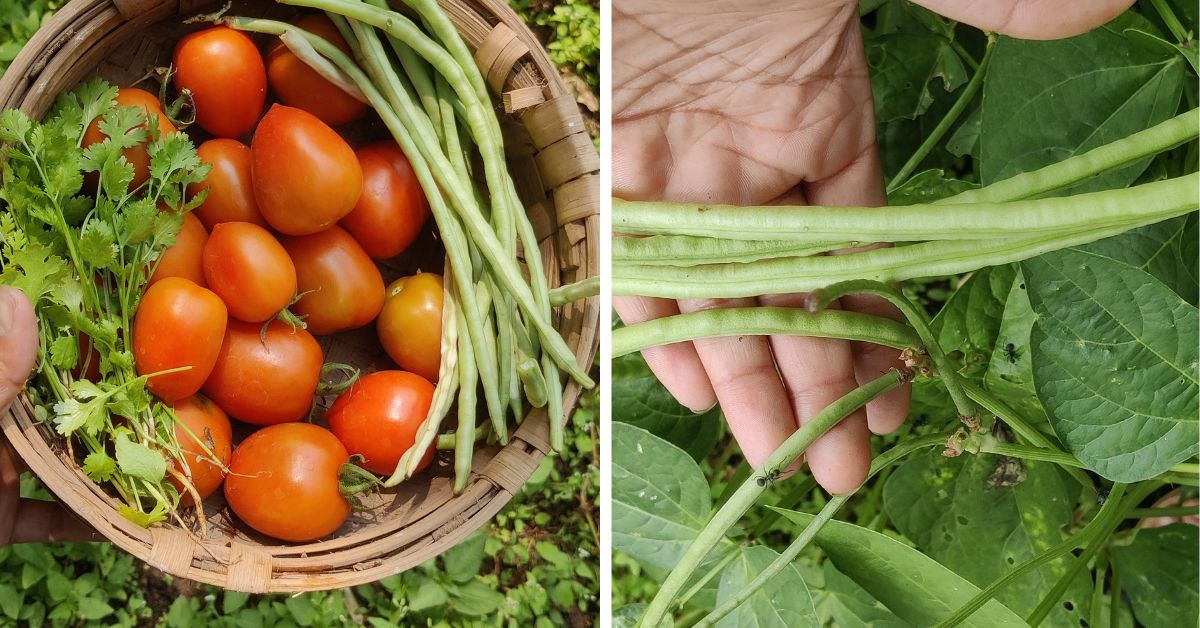
The Adiem Kaanan Farm is filled with over 2000 trees and boasts a number of rare fruit and vegetable varieties, Picture source: Disha
How would you react if you nurtured a piece of land for months and one day it burned down?
One summer, as Madhu walked into the fields that she had tirelessly worked on around the clock, she smelled smoke. Where there’s smoke, there’s fire.
The Tiger Grass (a tall warm-season clump forming grass with broad, bamboo-like green leaves) was burning as a result of the summer heat. Within minutes, the entire field was wiped out.
Recalling the incident she says, “This species of grass grows 10 feet high. Initially we were thrilled at having such , but we did not account for the cons. When the field burnt, we were back at the starting point.”
But perseverance coloured her decisions from then on.
Madhu familiarised herself with fire management techniques, methods of cutting grass, managing it during different seasons and ways through which she could mitigate the effects of the fire. Everything she has learnt about soil and farming, she says, is hinged on one fact — the jungle is an interdependent system.
“All plants, animals and insects help each other, and it’s only when people stop interfering with the system that they’ll see signs of growth.” But she emphasises that present-day pesticides and chemicals are the culprits, killing the heart of — the microbes in the soil.
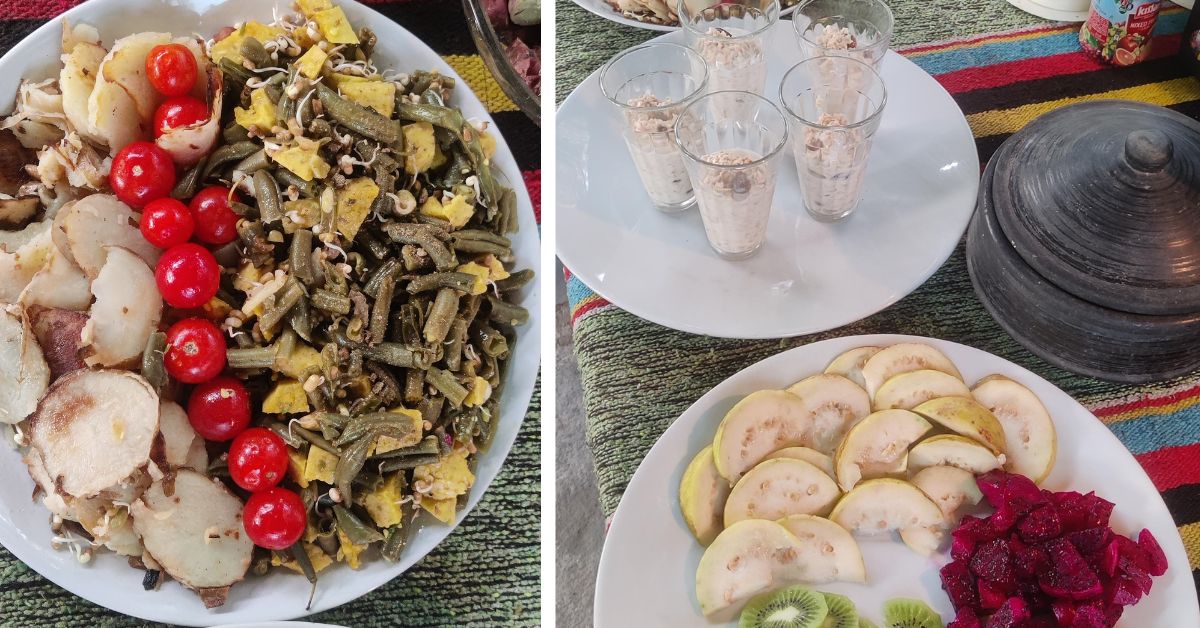
The ingredients for the meals at Adiem Kaanan Farmstay are sourced from the land are are fresh, healthy and delicious, Picture source: Disha
To anyone who is looking to see results with barren land, Madhu advises, “Instead of focusing on the plantation, use the initial years to help your soil survive. Once the soil survives with different kinds of microbes, you can step back.”
Tracing her steps back to the initial days on the land when she discovered how unyielding it was — “survival ratio of the plants and saplings was zero” — to today, the learning curve has only improved.
“What helped was doing a mono-culture of Glaricidia which is known for nitrogen-fixation (a chemical process by which molecular dinitrogen is converted into ammonia which can be absorbed by plants). It takes two years for the plant to grow, but it will help the land,” Madhu points out.
Take a good look at the microbiome she has fostered. It is the result of six years of hard work. But, she says, every effort and learning paved the way for success. Having quit the corporate world, Madhu and Disha decided to move to the village where they could further their by starting a homestay.
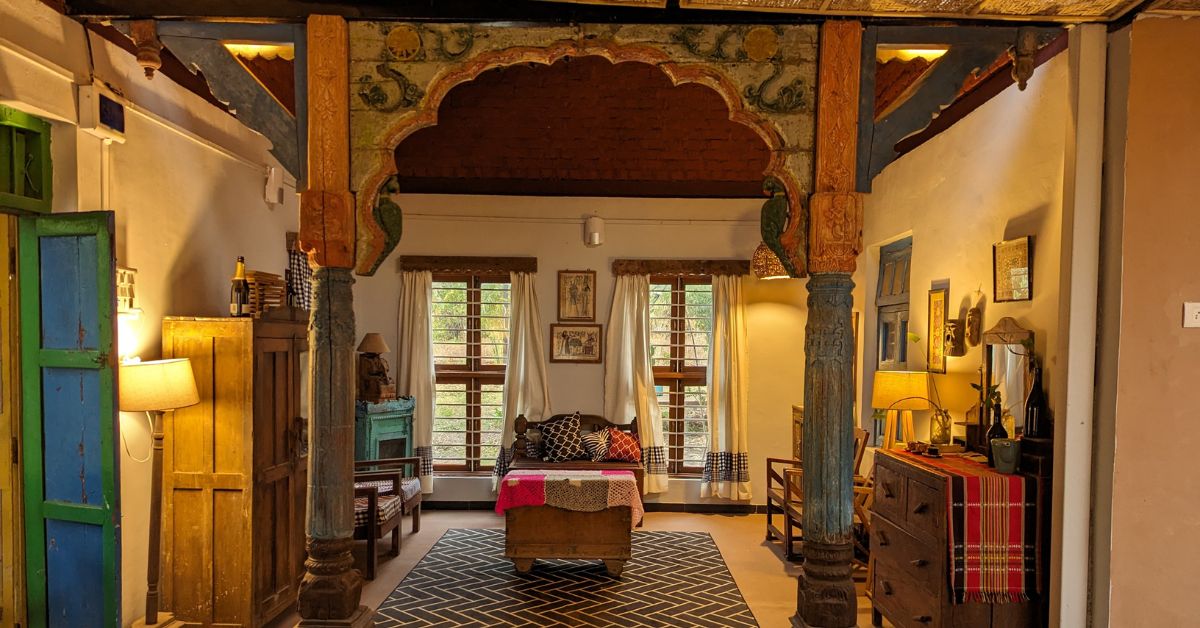
The Adiem Kaanan Farmstay is a sustainable homestay in Nashik village made with bamboo and mud, Picture source: Disha
While at the Adiem Kaanan Farmstay, brace yourself for a packed schedule. Bird watching in the early morning, followed by lazing and gorging on a Maharashtrian fiesta in the afternoon, followed by peacock spotting in the evening and long walks to digest the hearty meals, it’s a very tight schedule indeed! And it’s up to you to find time for the most prized activity the farmstay offers — fruit plucking.
The rewarding session begins with taking a basket out into the fields and then filling it with the choicest selection of lychees, gooseberries, jamun (java plum), falsa (a small, dark, purple fruit with a sweet and sour taste), apples, pears, oranges and more. The comes highly recommended by Disha who has spent much of her youth engaged in it.
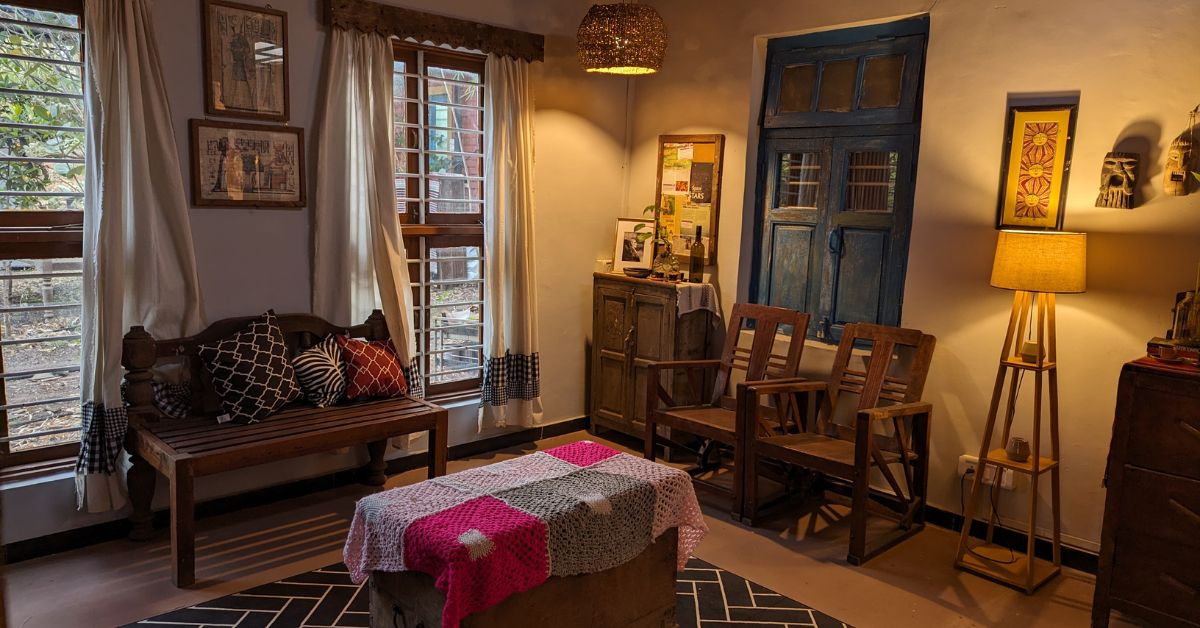
The Adiem Kaanan Farmstay sits on a six-acre piece of land that also boasts rainwater harvesting and solar panels, Picture source: Disha
Drawing parallels with the change in mindset living on a farm has brought about, she says, “When I was younger and saw my parents lead a sustainable life, I did not understand their reasons for these choices. I was always chasing life in a big city, a big house, a big car, etc. But during my time in the corporate world, I could see the functioning of the supply chains first-hand and how robotic it was.”
Now, growing her own food feels like a treat to the senses. “I can’t even express how freeing it feels.”
Adiem Farmstay boasts two cottages — a two-bedroom villa and a one-bedroom villa. The farmstay is powered by solar energy and has a brilliantly designed rainwater harvesting system.
“The system’s capacity is 32,000 litres,” says Madhu. “We are dependent on rainwater for our day-to-day needs and . We do not depend on the government at all. In fact, we give the government approximately 1,200 units every month.”
During mealtimes, Madhu insists on you having several helpings of mixed fruit desserts, jungle tea (which is made by boiling the leaves of some edible vegetables and jaggery), lychee sauce, rice kanji (a probiotic made of rice, water and curd), Sahajan leaves parthe (a drumstick speciality), Ova leaves pakode (a fried snack made of ajwain), and blue flower rice.
The locals love stopping by and lending their expertise. Madhu sees this bond as another win.
“It wasn’t always like this,” she notes, referring to the hostility they experienced when they first settled in the village.
“They [the people of the village] were of the opinion that we were city-folk and they did not want to be told what to do. When we offered them our harvested water they were sceptical of its purity and told us to have packaged water instead!” she shares.
Hilarious as this anecdote is, all’s well that ends well. And Madhu’s deep bonds with the village people today are a testament to this.
A trip to Adiem Kaanan Farmstay won’t leave you disappointed. For anyone who enters its doors, the homestay has a lot to offer — sometimes as a vacation, sometimes as a life experience.
Edited by Padmashree Pande
Pro tip: While you keep the road in focus, allow yourself a glance or two outside the windows. When it comes to delicious views, the ‘Grape Capital of India’ doesn’t disappoint. Miles of will guide you to this farmstay which is one of Nashik’s best-kept secrets.
Built with locally-grown bamboo and mud from the fields, the farmstay is sustainability personified, not just in its construction but also in the quotidian habits of the family that runs it.
Madhu Chougaonkar, the proud 59-year-old host, has a repository of such stories to narrate, but there will be time to hear all of them later, preferably over some tasty food.
As you enter the premises, I want you to take a minute to admire the lamps in the homestay’s living room. Would you believe that they are made from recycled wood?

The lamps and other decor at Adiem Kaanan Farmstay in Nashik, are made of recycled wood, Picture source: Disha
As Madhu’s daughter, Disha Madhu (Disha and her brother Deek have taken their mother’s name as their last name to shatter patriarchal stereotypes) points out, the lamps are one of the many in the homestay.
For a PhD graduate — Madhu has done her doctorate in ‘Reconstruction of Eco-Feminism’ — and a designer — Disha was working with a leading sports goods retailer in Bengaluru — it must have taken guts to quit the corporate hustle and set their sights on greener pastures (pun intended).
“Not really,” says Disha. “Just a wake-up call.”

Disha and her mother Madhu run two homestays at Nashik village and Nashik City respectively, Picture source: Disha
‘We didn’t want to be a part of the system anymore’
What would your first thought be if you saw a pretty t-shirt priced at Rs 200 and on sale? “How cheap! Let me buy it.”
Madhu would react the same way when she saw such offers on her shopping expeditions, not just in India but also in Bangladesh and Pakistan, where she was working with NGOs championing change at grassroot levels in underserved communities.
Her experiences gave her an insight into supply chains and the workings of economies. “My research made me realise that what we call ‘cheap’ is actually very expensive,” she notes.
Explaining this critique, she says, “While a product may seem economical from a monetary standpoint, there is so much exploitation that goes into producing certain items, like clothes for example. This includes labour, the many , and the unfair wages paid to those involved. If you look at it from this perspective, you’ll agree that nothing is ‘cheap’ even when it appears to be.”
Her two-decade-long experience in the development sector, during which she was associated with UNICEF and other affluent names, shaped her way of thinking and living.

The mother-daughter duo transformed the barren land into a thriving organic farm, Picture source: Disha
“Sustainability needs to be a way of life,” she believed. And, the way the Adiem Kaanan Farmstay is designed makes a good case for the point Madhu is trying to drive home.
Disha seconds her mother. “Sustainable living was the only kind of life we knew. Even before ‘sustainability’ was a buzzword, our family believed in it very strongly.”
Letting us in on how the two homestays — Adiem City Homestay in Nashik City and the Adiem Kaanan Farmstay 12 km away in the village — were born, Disha says it was a series of fortunate events that shaped things up.
The city homestay was where the family lived. In 2012, when Disha and Deek moved to Mumbai to study, the silence in the house was telling. It was around this time that Madhu and her husband, Arvind Chittewale, threw open the home’s doors to guests who were intrigued by its mud structure.

The Adiem City Homestay is made of mud and features recycled decor in every corner of the house, Picture source: Disha
They enjoyed a phenomenal response. “People were genuinely interested in experiencing and understanding the alternate lifestyle that we were leading. And this motivated our decision to run Adiem City Homestay commercially,” Disha notes.
While the homestay saw Madhu for part of the day, a patch in the village 12 km away (that she had purchased that same year) kept her busy the rest of the time. Once a dead patch unresponsive to any farming efforts, it is now .

The Adiem Kaanan Farm is filled with over 2000 trees and boasts a number of rare fruit and vegetable varieties, Picture source: Disha
‘The Earth does not need your interference’
How would you react if you nurtured a piece of land for months and one day it burned down?
One summer, as Madhu walked into the fields that she had tirelessly worked on around the clock, she smelled smoke. Where there’s smoke, there’s fire.
The Tiger Grass (a tall warm-season clump forming grass with broad, bamboo-like green leaves) was burning as a result of the summer heat. Within minutes, the entire field was wiped out.
Recalling the incident she says, “This species of grass grows 10 feet high. Initially we were thrilled at having such , but we did not account for the cons. When the field burnt, we were back at the starting point.”
But perseverance coloured her decisions from then on.
Madhu familiarised herself with fire management techniques, methods of cutting grass, managing it during different seasons and ways through which she could mitigate the effects of the fire. Everything she has learnt about soil and farming, she says, is hinged on one fact — the jungle is an interdependent system.
“All plants, animals and insects help each other, and it’s only when people stop interfering with the system that they’ll see signs of growth.” But she emphasises that present-day pesticides and chemicals are the culprits, killing the heart of — the microbes in the soil.

The ingredients for the meals at Adiem Kaanan Farmstay are sourced from the land are are fresh, healthy and delicious, Picture source: Disha
To anyone who is looking to see results with barren land, Madhu advises, “Instead of focusing on the plantation, use the initial years to help your soil survive. Once the soil survives with different kinds of microbes, you can step back.”
Tracing her steps back to the initial days on the land when she discovered how unyielding it was — “survival ratio of the plants and saplings was zero” — to today, the learning curve has only improved.
“What helped was doing a mono-culture of Glaricidia which is known for nitrogen-fixation (a chemical process by which molecular dinitrogen is converted into ammonia which can be absorbed by plants). It takes two years for the plant to grow, but it will help the land,” Madhu points out.
Take a good look at the microbiome she has fostered. It is the result of six years of hard work. But, she says, every effort and learning paved the way for success. Having quit the corporate world, Madhu and Disha decided to move to the village where they could further their by starting a homestay.

The Adiem Kaanan Farmstay is a sustainable homestay in Nashik village made with bamboo and mud, Picture source: Disha
Your chance to experience it
While at the Adiem Kaanan Farmstay, brace yourself for a packed schedule. Bird watching in the early morning, followed by lazing and gorging on a Maharashtrian fiesta in the afternoon, followed by peacock spotting in the evening and long walks to digest the hearty meals, it’s a very tight schedule indeed! And it’s up to you to find time for the most prized activity the farmstay offers — fruit plucking.
The rewarding session begins with taking a basket out into the fields and then filling it with the choicest selection of lychees, gooseberries, jamun (java plum), falsa (a small, dark, purple fruit with a sweet and sour taste), apples, pears, oranges and more. The comes highly recommended by Disha who has spent much of her youth engaged in it.

The Adiem Kaanan Farmstay sits on a six-acre piece of land that also boasts rainwater harvesting and solar panels, Picture source: Disha
Drawing parallels with the change in mindset living on a farm has brought about, she says, “When I was younger and saw my parents lead a sustainable life, I did not understand their reasons for these choices. I was always chasing life in a big city, a big house, a big car, etc. But during my time in the corporate world, I could see the functioning of the supply chains first-hand and how robotic it was.”
Now, growing her own food feels like a treat to the senses. “I can’t even express how freeing it feels.”
Adiem Farmstay boasts two cottages — a two-bedroom villa and a one-bedroom villa. The farmstay is powered by solar energy and has a brilliantly designed rainwater harvesting system.
“The system’s capacity is 32,000 litres,” says Madhu. “We are dependent on rainwater for our day-to-day needs and . We do not depend on the government at all. In fact, we give the government approximately 1,200 units every month.”
During mealtimes, Madhu insists on you having several helpings of mixed fruit desserts, jungle tea (which is made by boiling the leaves of some edible vegetables and jaggery), lychee sauce, rice kanji (a probiotic made of rice, water and curd), Sahajan leaves parthe (a drumstick speciality), Ova leaves pakode (a fried snack made of ajwain), and blue flower rice.
The locals love stopping by and lending their expertise. Madhu sees this bond as another win.
“It wasn’t always like this,” she notes, referring to the hostility they experienced when they first settled in the village.
“They [the people of the village] were of the opinion that we were city-folk and they did not want to be told what to do. When we offered them our harvested water they were sceptical of its purity and told us to have packaged water instead!” she shares.
Hilarious as this anecdote is, all’s well that ends well. And Madhu’s deep bonds with the village people today are a testament to this.
A trip to Adiem Kaanan Farmstay won’t leave you disappointed. For anyone who enters its doors, the homestay has a lot to offer — sometimes as a vacation, sometimes as a life experience.
Edited by Padmashree Pande
